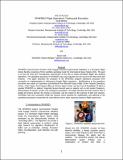SPHERES flight operations testing and execution
Author(s)
Mohan, Swati; Saenz-Otero, Alvar; Nolet, Simon; Miller, David W.; Sell, Steven
DownloadMiller_SPHERES flight.pdf (215.1Kb)
PUBLISHER_CC
Publisher with Creative Commons License
Creative Commons Attribution
Terms of use
Metadata
Show full item recordAbstract
Synchronized Position Hold Engage Reorient Experimental Satellites (SPHERES) is a formation flight testing facility consisting of three satellites operating inside the International Space Station (ISS). The goal is to use the long term microgravity environment of the ISS to mature formation flight and docking algorithms. The operations processes of SPHERES have also matured over the course of the first seven test sessions. This paper describes the evolution of the SPHERES program operations processes from conception to implementation to refinement through flight experience. Modifications to the operations processes were based on experience and feedback from Marshall Space Flight Center Payload Operations Center, USAF Space Test Program office at Johnson Space Center, and the crew of Expedition 13 (first to operate SPHERES on station). Important lessons learned were on aspects such as test session frequency, determination of session success, and contingency operations. This paper describes the tests sessions; then it details the lessons learned, the change in processes, and the impact on the outcome of later test sessions. SPHERES had very successful initial test sessions which allowed for modification and tailoring of the operations processes to streamline the code delivery and to tailor responses based on flight experiences.
Date issued
2009-04Department
Massachusetts Institute of Technology. Department of Aeronautics and AstronauticsJournal
Acta Astronautica
Publisher
Elsevier
Citation
Mohan, Swati, Alvar Saenz-Otero, Simon Nolet, David W. Miller, and Steven Sell. “SPHERES Flight Operations Testing and Execution.” Acta Astronautica 65, no. 7–8 (October 2009): 1121–1132.
Version: Author's final manuscript
ISSN
00945765